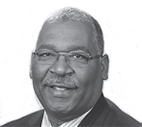It’s funny how stories come to you at the oddest times. As I rolled over and awakened from a restless sleep, I glanced at the clock. 4:18 a.m. was the time, and the voice that spoke to me gave me this story. This story is dedicated to those who grew up in a time when religious faith was more than a notion. It was a way of life that sustained a people.
The debate as to whether Christian faith has helped or hampered African Americans in this country has been ongoing for years. However, one thing is certain: The Black Church and the faith that built it have been instrumental in moving African Americans forward in this country.
Churches provided educational opportunities to the newly freed enslaved, primarily teaching millions of Blacks to read, a right that their oppressors previously denied them. According to Henry Louis Gates, Jr., in his book, “The Black Church: This Is Our Story, This is Our Song,” he writes “The independent Black Church gave all African Americans — all of them free now — freedom of expression, freedom of movement and freedom of prayer.”
However, the spiritual aspect of the Black Church cannot be overlooked because it was this space that provided the hope and perseverance to accomplish so much more than what their White oppressors had intended when they introduced Christianity to their captives. These spiritual aspects included singing and shouting as a part of their praise and worship. Many aspects of this worship contained aspects of their ancestral heritage from their homeland of Africa.
As the newly freed became more comfortable with their newfound religious freedoms, they took ownership of how they worshiped. Ministers and preachers began a new form of religious oration that included the familiar call and response that was often found in spirituals and songs and the “Ring Shouts,” which originated in West Africa. They took something just as they had done with the discarded food that the oppressors had given them. They added to what was presented to them and made it their own, creating a new form of religious experience that included a bonding, a driving force for change, and an ongoing drive for social justice.
Places of worship
Years later, in one of these southern Black churches, I would experience this spirituality that had been passed down through the centuries in my family. Growing up in the rural south, my family would only go to church every second and fourth Sunday at my church, Mt. Sinai Missionary Baptist, because we had a traveling preacher who lived in another town and was a pastor at another church. Sometimes, we went to a neighboring church, New Jerusalem, on third Sundays.
I guess my most profound memories began in church. My mind fast-forwards to the Revival Meeting, which was held nightly for approximately two weeks. Revival Meetings were church services where people prayed for their soul salvation, confessed their sins, and converted to Christianity through the belief that Jesus Christ had died for our sins, was buried, and, on the third day, rose again.
Those seeking salvation, sinners or non-believers, sat on the Mourner’s Bench. I remember when I sat on the Mourner’s Bench. It was hot, and I was old enough to sit on the Mourner’s Bench. I remember people saying, “How many they got on the Mourner’s Bench?” “How many sinners?” And while the number of people seeking salvation was a big deal, the number of people who actually “came off” the Mourner’s Bench or were converted was the biggest deal.
Voices carry
I remember songs like “Sinner, tell me what you are waiting on” and “I heard a voice.” I remember my sister telling me to tell the Lord to meet me at the church with the fire and Holy Ghost so that I could be filled with his spirit and be saved. I remember one particular night. It was hot, and the church was on fire spiritually! The spirit was everywhere, almost palatable; you could practically touch it. I heard one deacon say, “some soldier,” a saying that meant that someone in the audience was free to pray. I remember seeing my mother. I watched as she got down on her knees and started to pray. I had never heard her pray aloud. It was a fervent prayer, a sincere prayer. I cried as I heard her pray for my soul’s salvation. I was “saved” or converted to Christianity that summer.
Later that summer, I and others were baptized. I can still hear the preacher and other members of the church singing, “Take me to the water, baptize me.” Then, as we waded into the water, the preacher placed his hand on my shoulder and cried out, “Obedience to the Great Heads of the Church.” The water in Miccosukee Lake was cold, but my heart was warm that day. They baptized me in the name of “the Father, the Son, and the Holy Ghost.” I came up shiny and new and heard the words, “None but the righteous shall see God.” We had a church that day. Powerful church!
Over the years, I have come to learn and am constantly reminded that the journey to heavenly glory is fraught with traps and snares. The temptations of the world are powerful. But I remain faithful and prayerful. I admit I am not perfect, but when all else fails, I can rely on the faith and beliefs I experienced, and so many African Americans have also relied on me for comfort and hope.
Given the world we live in, I am grateful for my faith — a faith that I share with my family and so many others. It allows for love when faced with hate, hope when faced with despair, and belief when all logic and reason have been abandoned. It may not be for everyone, but as for me and my house, we will serve the Lord.


Recent Comments